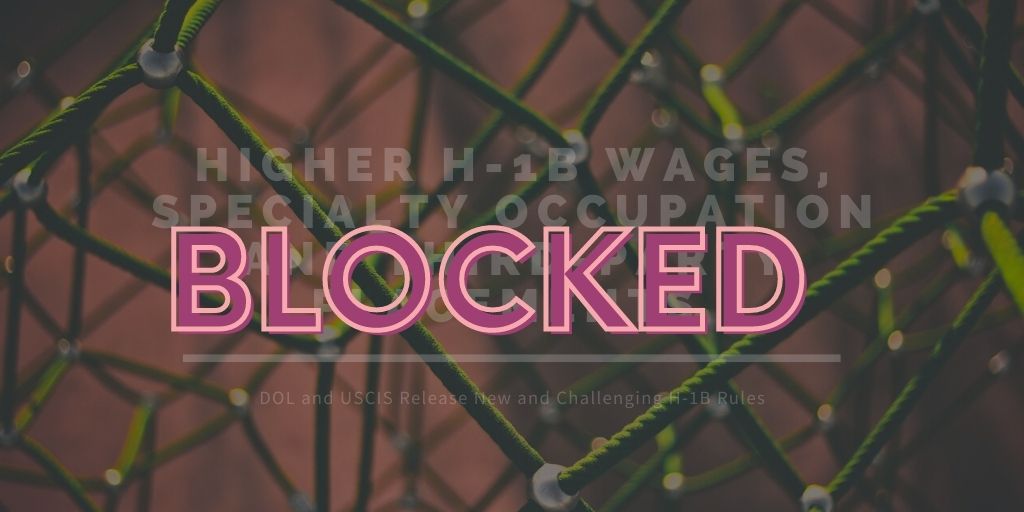US District Court Blocks DOL Wage Levels and DHS H-1B Amendment Rules
In a December 1, 2020 opinion (PDF copy), a U.S. Judge in Northern California has blocked the implementation of both the DOL and DHS/USCIS Interim Final Rules (IFR) which were introduced in October seeking to substantially increase the DOL wage levels used for H-1B and PERM Labor Certification cases and which also sought to introduce substantial changes to the H-1B program, including third-party worksite placements and specialty occupation.
As a result, DOL is expected to reinstate the pre-October 8 wage levels and DHS is prevented from implementing the new rules which were scheduled to be effective on December 7, 2020.
Background on Intended DOL and DHS Rules
As a background, the DOL IFR sought to change the way the wage levels are calculated and essentially to substantially increase the minimum salaries that have to be paid for an H-1B or a PERM Labor Certification. This resulted in some minimum H-1B salaries increase by 30-40% or more for many positions. For some positions DOL did not even have adequate data and resulted in anomalous wage levels.
At the same time, DHS sought to make substantial changes to the H-1B rules most notably seeking to limit third-party H-1B placements to one year only and also seeking to make notable changes to the definition of specialty occupation.
See our October 7, 2020 alert for details on what the new rules sought to change.
October 2020 DOL and DHS Rules Temporarily Blocked
The its opinion, the Court noted that DOL/DHS have “failed to show there was good cause to dispense with the rational and thoughtful discourse that is provided by the APA’s notice and comment requirements” which essentially means that DOL/DHS should have undergone the normal rulemaking process, including the public comment period as opposed to using the Interim Final Rule (IFR) process to immediately introduce rule changes.
It is possible that DOL and DHS may seek to change the rules again by following the rulemaking process although this process will take months and the upcoming administration may not be supportive of such effort.
DOL Reinstatement of Pre-October 8, 2020 Wage Levels
As a result of the order, it is expected that DOL will revert to the pre-October 8, 2020 wage levels. It is possible that DOL may take a few days to update and reinstate the wage data but we expect this to happen very soon.
What Happens to Prevailing Wage Determinations and LCAs Issued with the Higher (Post-October 8th) Wage Levels?
As of the time of this article DOL has not provided guidance or clarification as to whether prevailing wage determinations (PWD) or Labor Condition Applications (LCA) will remain valid. At this time our expectation is that PWDs and LCAs issued with the higher wage levels will remain valid although employers may consider either redoing an LCA or asking for reconsideration of a prevailing wage issued with the higher wage levels.
H-1B Rules Remain Unchanged
The now-stricken H-1B rule amendments had not yet become effective (they were due to become effective on December 7, 2020). As a result, there will be no changes to the H-1B rules with respect to shorter third-party worksite placements or specialty occupation and the current H-1B rules and regulations remain in effect.
Conclusion
We welcome the Court’s decision to block the DOL and DHS rules as our office has seen firsthand the sudden and negative impact on U.S. employers.
Our office will continue monitoring related developments and provide updates. Please do not hesitate to contact us if we can be of any help in preparing or otherwise assisting with H-1B petitions. Also, please feel free to subscribe to our free weekly newsletter to obtain developments on this and related topics
Related News and Articles
The Capitol Immigration Law Group has been serving the business community for over 15 years and is one of the most widely respected immigration law firms focused solely on U.S. employment-based immigration. Disclaimer: we make all efforts to provide timely and accurate information; however, the information in this article may become outdated or may not be applicable to a specific set of facts. It is not to be construed as legal advice.

